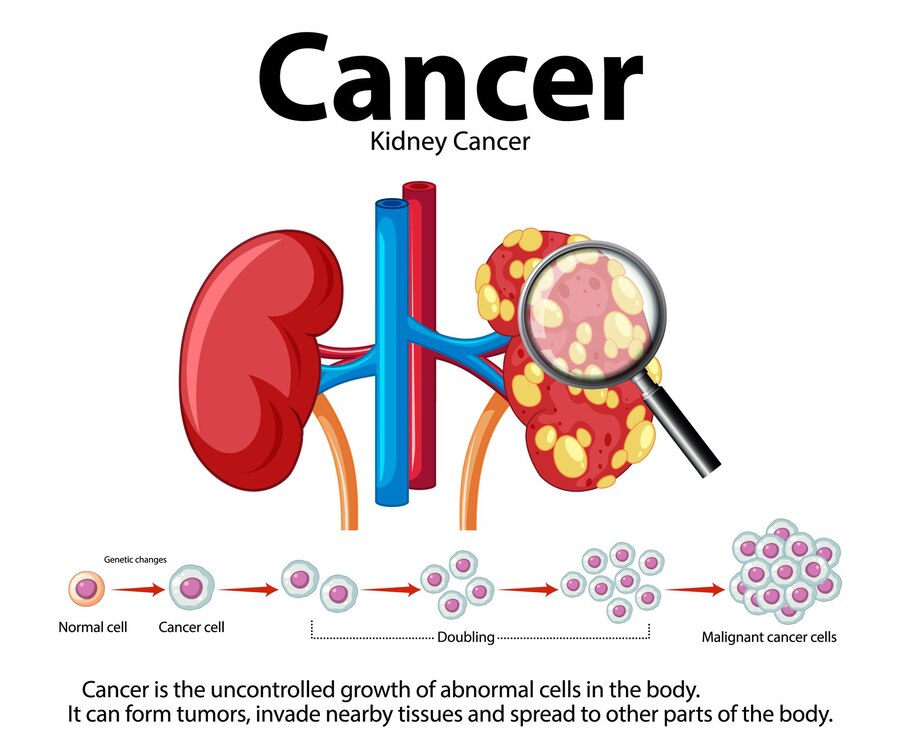Kidney Cancer: Detection and Treatment Options

Kidney cancer, also known as renal cancer, is a serious condition that affects the kidneys, the vital organs responsible for filtering waste and excess fluids from the body. Early detection and effective treatment are crucial to improving outcomes for individuals diagnosed with kidney cancer. In this blog, we will discuss the various methods for detecting kidney cancer and explore the available treatment options to help manage the disease.
Signs and Symptoms of Kidney Cancer
Kidney cancer may not cause noticeable symptoms in its early stages, but as the disease progresses, individuals may experience several common signs, including:
- Blood in the urine (hematuria)
- Pain in the side or lower back
- A lump or mass in the abdomen
- Unexplained weight loss
- Fatigue
- Fever
- Loss of appetite
If any of these symptoms appear, it’s essential to consult a healthcare professional for evaluation and possible diagnostic testing.
Detection and Diagnosis of Kidney Cancer
Detecting kidney cancer at an early stage can significantly improve the chances of successful treatment. The following diagnostic tools and tests are commonly used to detect kidney cancer:
- Physical Exam and Medical History
A thorough physical examination and review of the patient’s medical history help doctors identify any potential risk factors, such as family history, smoking, or hypertension, which can increase the risk of kidney cancer. - Imaging Tests
Imaging techniques are essential in diagnosing kidney cancer and assessing its size, location, and whether it has spread. Common imaging tests include:- Ultrasound: Helps identify tumors in the kidneys.
- CT Scan (Computed Tomography): Provides detailed images of the kidneys and surrounding structures.
- MRI (Magnetic Resonance Imaging): Used for more detailed imaging, particularly when assessing kidney function and tumor spread.
- Biopsy
In some cases, a biopsy may be performed, where a small sample of tissue is taken from the tumor and analyzed to confirm if it is cancerous. This is typically done if imaging tests reveal suspicious growths.
Treatment Options for Kidney Cancer
Treatment for kidney cancer depends on the stage of the cancer, the size of the tumor, and the overall health of the patient. Common treatment options include:
- Surgical Treatments
Surgery is the most common and effective treatment for kidney cancer, especially in the early stages:- Partial Nephrectomy: Removal of the tumor along with a portion of the kidney. This is often preferred when the tumor is small and localized.
- Radical Nephrectomy: Removal of the entire kidney along with surrounding tissues, including lymph nodes, if necessary. This is typically done for larger tumors or more advanced stages of cancer.
- Ablation Therapies
Ablation is a non-surgical treatment option used to destroy tumors. Common ablation techniques include:- Radiofrequency Ablation (RFA): Uses heat to destroy the cancer cells.
- Cryoablation: Uses extreme cold to freeze and eliminate the tumor.
- Targeted Therapy
Targeted therapy uses medications that specifically target cancer cells while minimizing damage to healthy cells. These therapies are often used in advanced stages of kidney cancer or when surgery is not an option. They work by blocking the signals that allow cancer cells to grow and spread. - Immunotherapy
Immunotherapy is a treatment that boosts the body’s immune system to fight cancer cells. It involves using drugs that stimulate the immune system to attack the tumor more effectively. Immunotherapy is often used for advanced kidney cancer, especially when other treatments have not been successful. - Chemotherapy
Chemotherapy uses powerful drugs to kill cancer cells or stop their growth. While not typically the first-line treatment for kidney cancer, it may be used if other treatments do not work or if the cancer has spread to other parts of the body. - Radiation Therapy
Radiation therapy may be used to treat kidney cancer that has spread to other parts of the body, such as the bones or lungs. It uses high-energy rays to shrink or kill cancer cells in targeted areas.
Managing Kidney Cancer After Treatment
After treatment, ongoing monitoring and follow-up care are essential to ensure the cancer has been successfully treated and to detect any recurrence. Follow-up care may include:
- Regular imaging tests (CT scans, MRIs, or ultrasounds)
- Blood tests to monitor kidney function and detect potential signs of cancer returning
- Physical exams and assessments of overall health
Conclusion
Kidney cancer can be a challenging diagnosis, but with early detection and the right treatment, many patients can achieve favorable outcomes. By staying vigilant for symptoms and consulting with healthcare professionals, individuals can take proactive steps toward managing kidney cancer effectively. Whether through surgery, targeted therapies, or immunotherapy, treatment options have evolved to provide more personalized and effective care. If you suspect kidney cancer or have risk factors, seeking medical advice early can lead to better prognosis and outcomes.


Leave a Reply